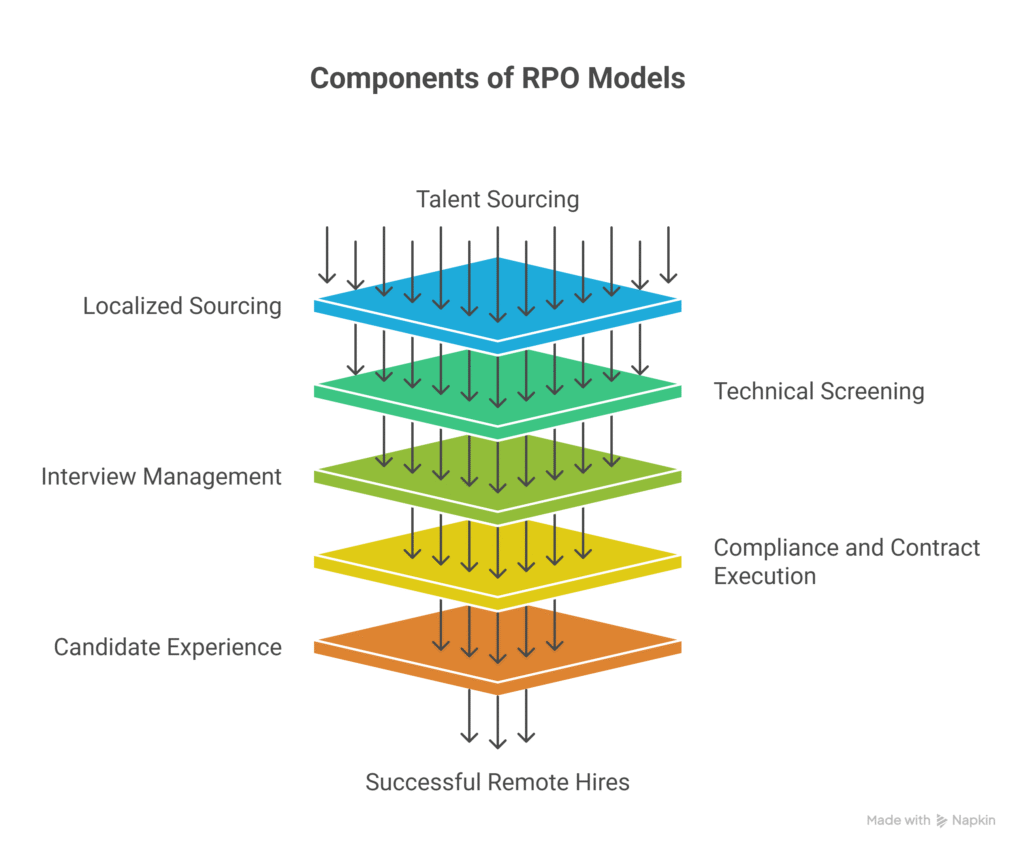Recruitment Process Outsourcing (RPO) is a strategic partnership where a company transfers all or part of its talent acquisition function to an external recruitment firm that acts as an extension of its HR team. This model improves hiring speed, quality, and scalability by leveraging the provider’s technology, recruiter network, and market expertise to deliver consistent, data-driven recruitment outcomes.
Recruitment Process Outsourcing (RPO) helps businesses reduce costs, improve time-to-hire, and access specialized expertise in sourcing top talent. Whether you’re scaling quickly or refining your workforce strategy, RPO provides the flexibility and resources needed to meet your goals.
By leveraging data-driven strategies and advanced technology, RPO providers enhance candidate quality while ensuring compliance with labor laws and industry standards. They manage everything from job postings and applicant tracking to interviews and onboarding, freeing up your internal team for other priorities.
If you’re looking to optimize hiring efficiency without compromising on quality, understanding how RPO works could transform the way you build your team.
Are you ready to explore how this solution can align with your business objectives?
Deploy End-to-End RPO to Accelerate Long-Term Hiring
End-to-end Recruitment Process Outsourcing (RPO) integrates every stage of hiring, from sourcing candidates to onboarding. This approach ensures operational efficiency and aligns recruitment strategies with long-term business goals.
By outsourcing the entire process, you reduce administrative burdens while accessing scalable solutions for workforce expansion.
Streamline Talent Acquisition Across Borders
If you’re targeting offshore or nearshore talent acquisition in Latin America, end-to-end RPO simplifies cross-border recruiting. Providers handle compliance requirements like payroll and contracts, ensuring legal adherence when hiring full-time employees outside the US. This eliminates risks tied to labor law violations and supports seamless remote team onboarding.
Scale Teams Without Compromising Quality
An end-to-end RPO model helps scale teams efficiently by leveraging pre-built talent pipelines. For example, engineering teams or marketing roles can be filled faster due to access to region-specific databases and networks. With a focus on C1/C2 English-level professionals, this strategy maintains high communication standards for US timezone remote teams.
Optimize Costs While Expanding Globally
Outsourcing your recruitment process reduces costs compared to building an internal team for international hiring. Nearshore staffing offers cost-effective hiring without compromising quality by tapping into competitive salary benchmarks in LATAM. Also, RPO providers manage retention planning for remote hires, minimizing turnover expenses over time.
Enhance Onboarding and Retention Strategies
RPO providers ensure smooth onboarding processes tailored for distributed teams. Remote sales team members or fully integrated remote teams benefit from structured workflows that foster alignment across borders. Performance management tools further support long-term success by tracking productivity metrics specific to remote-first environments.
Align RPO Strategy With Business Outcomes and Growth Velocity
Aligning your Recruitment Process Outsourcing (RPO) strategy with business outcomes ensures scalable hiring that supports growth. Start by identifying key performance indicators (KPIs) tied to your objectives, such as reducing time-to-hire for nearshore or offshore tech talent or increasing retention rates among full-time remote employees. These metrics provide measurable benchmarks to evaluate success.
Integrate workforce planning into your RPO framework to match hiring velocity with projected growth. For example, if you’re scaling engineering teams nearshore or building a remote sales team in Latin America, collaborate with your RPO provider to develop pre-built talent pipelines. This approach minimizes delays during rapid expansion phases while maintaining quality standards.
Use data-driven insights from your RPO partner to refine recruitment workflows. If you’re targeting C1 English level professionals or teams in friendly US timezones, analyze candidate sourcing channels and adjust strategies based on performance metrics like application-to-hire ratios. Leveraging these insights optimizes the remote hiring process and aligns it with long-term goals.
Focus on compliance when expanding across borders. Compliant hiring in Latin America, North Africa, or Eastern Europe requires adherence to local labor laws, tax regulations, and payroll management standards. An experienced RPO provider simplifies this complexity by offering contract and payroll LATAM talent solutions, ensuring risk mitigation while supporting operational efficiency.
Prioritize cultural alignment and communication skills when onboarding nearshore employees. For roles requiring high collaboration—such as marketing roles nearshore or technical positions—evaluate candidates’ ability to integrate seamlessly into distributed teams operating in similar time zones. Structured onboarding processes tailored for remote hires improve engagement and reduce turnover risks.
Maintain flexibility within your RPO strategy to adapt to market changes or shifts in business priorities. Whether you’re managing teams across US and nearshore/offshore regions or setting up a nearshore team for long-term growth, an agile approach helps address challenges like fluctuating demand or skill shortages without compromising productivity.
Specialize RPO Delivery by Function: Sales, Marketing, Engineering
Sales Recruitment
RPO providers streamline the recruitment of remote marketing, engineering, or sales teams by leveraging remote talent acquisition strategies.
You can access C1/C2 English-speaking professionals who align with US timezone requirements, ensuring seamless communication and productivity. These candidates excel in building client relationships and driving revenue growth for distributed teams. By partnering with a nearshore recruitment agency, you reduce hiring costs while maintaining quality standards critical to scaling your sales operations.
For long-term success, focus on retention planning for remote hires. Performance management tools tailored for nearshore teams help track key metrics like lead conversion rates and customer satisfaction scores. When setting expectations with remote hires, define clear sales targets and provide ongoing training to enhance their effectiveness.
Marketing Roles
Recruiting marketing roles through specialized RPO delivery ensures access to creative talent familiar with global trends and local market nuances.
Nearshore staffing partners identify LATAM professionals skilled in content creation, digital advertising, SEO strategy, and brand development. These marketers often possess advanced English proficiency (C1 level or higher), enabling them to craft campaigns that resonate with US audiences.
To maximize ROI from remote marketing hires, integrate them into your existing workflows using collaboration platforms suited for distributed teams.
Establishing a structured onboarding process helps new employees adapt quickly while aligning their efforts with your business goals. Retaining remote employees in LATAM requires fostering engagement through regular feedback sessions and recognition programs.
Engineering Teams
Nearshore or offshore tech talent offers a cost-effective solution for building engineering teams without compromising expertise or innovation. Many engineers in Latin America specialize in software development, cloud computing, AI integration, and cybersecurity—skills essential for modern businesses scaling their technical infrastructure.
Working with a global recruiting partner simplifies cross-border compliance when hiring full-time employees outside the US. This approach eliminates the need for establishing foreign entities while providing payroll and legal coverage aligned with local regulations.
To ensure operational efficiency within your engineering team setup, adopt agile methodologies that support time zone alignment between US-based stakeholders and remote developers.
By focusing on these functional areas—sales, marketing, and engineering—you create fully integrated global teams capable of driving growth across multiple business dimensions while maintaining high performance standards at reduced costs.

Centralize Talent Acquisition Through Global RPO Hubs
Centralizing talent acquisition through global recruitment process outsourcing hubs simplifies hiring for US businesses. These hubs streamline the hiring process by consolidating sourcing, screening, and onboarding functions into a single operational framework. This approach reduces inefficiencies and ensures access to skilled professionals in Latin America who align with your business needs.
Optimize Access to Skilled Talent
Nearshore RPO hubs provide access to C1/C2 English level professionals. For example, engineering teams nearshore benefit from cost-effective hiring without compromising quality, while marketing job titles gain creative expertise attuned to both global trends and local market demands.
Simplify Compliance and Payroll Management
Managing contract and payroll becomes easier when leveraging global staffing partners. These providers handle compliant hiring in multiple regions across the globe, ensuring adherence to local labor laws while mitigating risks associated with cross-border recruiting.
If you’re scaling teams with remote professionals or setting up an international team for long-term growth, this support eliminates administrative burdens tied to legal considerations when hiring.
Enhance Scalability for Long-Term Growth
Nearshore RPO hubs enable rapid headcount expansion by maintaining pre-built pipelines of qualified candidates. Whether you’re building a distributed team or expanding operations with full-time international employees, these hubs ensure consistent scalability aligned with your growth objectives. Remote-first hiring infrastructure supports seamless onboarding of remote hires from around the globe while fostering retention planning for remote hires.
Improve Operational Efficiency Across Teams
Using an integrated approach through RPO hubs enhances performance management for nearshore teams by tracking productivity metrics across sales, marketing, and technical roles. For instance, remote dev teams can leverage proximity to US markets for faster client interactions.
Leverage Regional Recruiters and Pre-Vetted Talent Pools
Regional recruiters simplify recruitment by offering top expertise. They understand labor laws, cultural nuances, and market trends in Latin America, ensuring compliant hiring processes for US businesses. Their networks include pre-vetted talent pools, providing immediate access to skilled professionals across various roles like engineering, marketing, and sales.
Pre-vetted talent pools save time during the hiring process. Candidates are screened for qualifications such as C1 or C2 English proficiency, technical skills, and remote work experience. This ensures you hire nearshore professionals who align with your business needs while reducing turnover risks.
Using regional recruiters accelerates scaling efforts. For example, when building a remote team in your time zone, these experts connect you with candidates with the right expertise that you need for your projects. This alignment improves communication within distributed teams and enhances productivity.
By leveraging pre-built pipelines of qualified candidates through regional recruiters, you can scale quickly without compromising quality. Whether you’re expanding engineering teams nearshore or setting up a remote sales team in LATAM, this approach ensures seamless integration into your existing operations.
Integrate RPO Workflows With Your ATS and Global Hiring Stack
Integrating Recruitment Process Outsourcing (RPO) workflows with your internal Applicant Tracking System (ATS) and broader hiring infrastructure creates a unified, efficient, and compliant recruitment ecosystem. This alignment is critical when scaling nearshore and offshore teams across regions like Latin America, Eastern Europe, and North Africa—where marketing, engineering, and sales roles demand precision, speed, and consistency.
Centralize Candidate Data
A synchronized ATS–RPO setup consolidates every candidate interaction into one system of record. From sourcing engineers in Poland to onboarding sales representatives in Morocco or content marketing specialists in Colombia, unified data visibility enables faster decision-making and stronger pipeline management without switching platforms.
Automate and Accelerate Core Hiring Tasks
Integrating automation within your RPO stack eliminates bottlenecks in resume parsing, interview scheduling, and compliance validation. Tasks like payroll setup, background verification, or multilingual contract generation can run automatically—reducing manual effort and ensuring faster placements for technical, creative, or commercial roles.
Boost Collaboration Between Internal and RPO Teams
Shared platforms bridge communication gaps between internal HR teams and offshore RPO partners. Real-time access to candidate pipelines and interview feedback ensures synchronized hiring decisions, whether scaling a development hub in Romania or expanding a remote sales team in Tunisia.
Leverage Advanced Analytics and Insights
A fully integrated hiring system enhances visibility into KPIs such as time-to-fill, offer acceptance rate, and retention. Businesses can benchmark salary ranges for digital marketers in Latin America or engineers in Eastern Europe while using data to refine sourcing strategies and performance targets.
Maintain Global Compliance and Data Security
When offshoring recruitment, compliance is non-negotiable. Integrated workflows automate adherence to regional labor laws, GDPR, and local payroll regulations. Encryption and controlled access safeguard sensitive candidate and contract data across multiple jurisdictions.
A seamless RPO–ATS integration doesn’t just improve efficiency—it builds the foundation for global scalability. Companies that hire offshore marketing, engineering, and sales talent through unified systems gain measurable speed, compliance assurance, and a stronger return on every recruitment investment.
Maintain Visibility With Custom Dashboards and SLA Reporting
Visibility is the foundation of efficient global recruitment. By combining Recruitment Process Outsourcing (RPO) analytics with customized dashboards and Service Level Agreement (SLA) reporting, businesses gain full control over offshore and nearshore hiring performance across Latin America, Eastern Europe, and North Africa.
Centralize Recruitment Intelligence
Custom dashboards consolidate every data point—sourcing speed, interview progress, offer acceptance, and onboarding outcomes—into one visual hub. Whether hiring email marketing specialists in Argentina, sales managers in Nigeria, or software engineers in Romania, you can track metrics such as time-to-fill, cost-per-hire, and retention in real time. This transparency helps identify bottlenecks before they impact deliverables or hiring velocity.
Measure What Matters Through SLA Reporting
Service Level Agreements turn hiring expectations into measurable outcomes. SLAs define performance standards like candidate quality, compliance turnaround times, and onboarding success rates. Regular reports between your internal HR team and RPO provider ensure accountability while revealing areas for optimization—especially when scaling distributed marketing, engineering, or sales teams across multiple time zones.
Integrate With Your ATS for Real-Time Oversight
When integrated with your Applicant Tracking System (ATS), these dashboards automate recurring administrative processes such as interview scheduling, background verification, and offer documentation. This automation preserves efficiency while maintaining visibility over remote recruitment pipelines across offshore hubs.
Ensure Compliance and Minimize Risk
Accurate reporting reduces payroll, tax, and regulatory risks that often arise in cross-border hiring. For example, when partnering with an offshore staffing agency in Egypt or a tech recruiter in Poland, SLA-driven compliance tracking ensures every hire meets local labor standards and documentation timelines.
Strengthen Decision-Making and Trust
Data-backed visibility builds confidence among stakeholders. With clear dashboards, U.S. companies can evaluate talent pipeline health, hiring cycle time, and retention metrics without relying on anecdotal updates. The result is a predictable, transparent system for scaling global teams—whether building a nearshore marketing department, offshoring software development, or expanding regional sales operations.
In short, custom dashboards and SLA reporting transform recruitment from reactive to strategic—giving leaders full visibility, measurable accountability, and operational control across every offshore and nearshore hire.
Optimize RPO ROI With Continuous Data-Driven Improvements
Maximizing the return on investment (ROI) from Recruitment Process Outsourcing (RPO) requires a disciplined, data-driven approach. Regular performance analysis ensures your offshoring and nearshoring strategies—whether in Latin America, Eastern Europe, or North Africa—consistently align with business objectives across marketing, engineering, and sales functions.
Track and Benchmark Core Performance Metrics
Consistent tracking of key metrics such as time-to-hire, cost-per-hire, offer acceptance, and retention rates enables better visibility into recruitment performance. Integrating RPO analytics with your Applicant Tracking System (ATS) centralizes data, allowing you to compare hiring efficiency across offshore regions. For example, you might evaluate developer retention rates in Romania versus marketing campaign turnover in Central America to identify process gaps and improvement areas.
Use Predictive Analytics for Workforce Planning
Predictive analytics transforms recruitment from reactive to strategic. By analyzing hiring trends, skill availability, and regional salary fluctuations, you can anticipate talent shortages or surges in demand. This approach is critical for U.S. companies expanding offshore marketing operations in North Africa or scaling technical teams in Eastern Europe, ensuring hiring plans stay ahead of market conditions.
Refine and Diversify Talent Pipelines
Maintaining robust, pre-qualified talent pools strengthens responsiveness to new project demands. Work closely with your RPO provider to curate candidate databases segmented by region, language proficiency, and specialization—whether sourcing bilingual sales operations manager in Tunisia, data analysts in Poland, or Paid Ads marketers in Ecuador. A proactive pipeline strategy minimizes time-to-fill and safeguards business continuity.
Reduce Turnover Through Retention Analytics
Retention directly impacts ROI. Tracking post-hire metrics—such as engagement scores, productivity, and tenure—helps identify early signs of attrition within distributed teams. Structured onboarding, regular performance reviews, and cultural integration initiatives are essential for long-term stability when managing remote teams across multiple time zones.
Continuously Adapt Recruitment Strategies
Data insights should drive continuous optimization. If hiring timelines lag or cost-per-hire increases in specific markets, adjust sourcing channels, refine your employer value proposition, or renegotiate local compensation benchmarks. Collaboration with RPO partners experienced in compliant offshoring ensures scalability without compromising legal or operational standards.
When executed strategically, continuous improvement turns RPO into more than a cost-saving measure—it becomes a competitive advantage. Businesses that apply analytics, optimize pipelines, and maintain agile hiring systems achieve faster scaling and higher-quality outcomes across marketing, engineering, and sales teams worldwide.
Key Components of a High-Performance Offshore and Nearshore RPO Model
A modern Recruitment Process Outsourcing (RPO) framework must be built for scalability, compliance, and precision. For U.S. companies offshoring or nearshoring marketing, engineering, and sales talent in regions such as Latin America, Eastern Europe, and North Africa, success depends on specialized workflows and regional expertise that align with business goals and time zones.

Embedded Recruiter Pods by Function and Time Zone
High-performing RPOs deploy recruiter pods segmented by discipline—marketing, engineering, and sales—ensuring domain-specific expertise in every search. These pods operate within overlapping time zones, allowing real-time communication with U.S. hiring managers and minimizing lag during recruitment cycles.
For example, engineering recruiters in Poland or Tunisia focus on evaluating technical proficiency and agile collaboration skills, while marketing recruiters in Guatemala or Morocco specialize in sourcing bilingual professionals experienced in content strategy and digital campaigns. Embedding function-specific recruiters leads to faster placements and better alignment between candidate skills and business needs.
Localized Sourcing and Structured Talent Pipelines
Localized sourcing ensures relevance and compliance. RPO partners tap into pre-vetted regional talent pools—whether it’s graphic designers in Chile, software engineers in Romania, or enterprise sales directors in Egypt. These pipelines are continuously refreshed using regional job boards, alumni networks, and referral systems.
The result is a predictable flow of candidates ready for long-term remote or hybrid positions. By maintaining structured, localized pipelines, your organization reduces time-to-hire and mitigates the risk of candidate shortages during growth phases.
Technical Screening, Interview Management, and Shortlisting
RPO providers standardize the assessment process by coordinating interviews, running role-specific evaluations, and shortlisting only qualified candidates. Engineering candidates might complete live coding or DevOps assessments, while marketers undergo case studies on campaign execution and analytics reporting.
Centralized scheduling tools manage time zone differences between U.S., Eastern European, and North African teams, ensuring efficient collaboration. This level of precision accelerates decision-making and guarantees you only engage with candidates who meet performance and communication standards.
Compliance and Contract Execution via Local EORs
Managing compliance across borders is complex. A robust RPO model integrates Employer of Record (EOR) solutions that handle payroll, taxation, benefits, and contract administration in each jurisdiction. Whether hiring engineers in Serbia, marketers in Chile, or sales managers in Kenya, local EOR support eliminates the need for separate legal entities while ensuring compliance with national labor laws.
This reduces administrative friction and shields your company from misclassification or tax exposure—critical when scaling globally with distributed teams.
Candidate Experience and Retention Management
A seamless candidate experience drives stronger employer branding and higher retention rates across offshore markets. Top RPO partners emphasize communication transparency, feedback loops, and cultural alignment to build trust with remote professionals.
For example, providing timely feedback and personalized onboarding improves loyalty among marketing specialists in Latin America or technical leads in Eastern Europe. A positive candidate journey not only boosts offer acceptance rates but also establishes your company as a preferred employer in competitive talent markets.
When to Choose Offshore or Nearshore RPO Over Internal Hiring
Recruitment Process Outsourcing (RPO) becomes a strategic growth lever when your internal hiring infrastructure can’t meet the speed, scale, or specialization your business demands.
For U.S. companies expanding into Latin America, Eastern Europe, or North Africa, partnering with an offshore or nearshore RPO provider delivers access to qualified marketing, engineering, and sales professionals faster and more efficiently than traditional in-house hiring.
When Growth Outpaces Internal Recruitment Capacity
As your business scales, internal HR teams often struggle to fill roles quickly—especially in specialized functions such as digital marketing, software engineering, or enterprise sales. Offshore and nearshore RPO providers maintain pre-vetted candidate pipelines, enabling faster placements without compromising on quality.
For instance, if you’re hiring remote software engineers in Romania or performance marketers in Colombia, an RPO partner can present top candidates in days, not months. This scalability allows your business to maintain momentum during product launches, fundraising rounds, or market expansions without overwhelming your internal recruitment resources.
When You Lack Local Market Expertise and Compliance Knowledge
Hiring internationally introduces legal, cultural, and operational complexities that most internal teams aren’t equipped to handle. Offshore and nearshore RPO providers bring in-depth regional expertise—covering local labor laws, salary benchmarks, and compliance frameworks in markets like Mexico, Egypt, or Poland.
This localized insight minimizes risk while ensuring smooth operations. For example, in Latin America, RPO partners handle REPSE registration and EOR (Employer of Record) compliance, while in Eastern Europe they manage GDPR adherence and cross-border contract execution. The result: compliant, secure, and efficient hiring across distributed teams.
When Expanding Into New Geographies Requires Speed and Flexibility
Rapid global expansion demands agility that internal hiring processes rarely provide. A nearshore RPO partner enables immediate entry into new regions by managing end-to-end recruitment operations—from sourcing and vetting to onboarding and retention.
If your company is opening engineering hubs in Eastern Europe or remote sales teams in North Africa, an RPO model removes logistical barriers. These partners coordinate hiring within overlapping time zones, provide bilingual recruiters, and ensure seamless onboarding through region-specific playbooks.
For U.S. companies offshoring marketing, engineering, or sales functions, RPOs serve as both compliance protectors and growth accelerators—helping you scale global teams efficiently while maintaining quality, speed, and cultural alignment.
Challenges of Offshore and Nearshore RPO in Emerging Talent Regions
Recruitment Process Outsourcing (RPO) across Latin America, Eastern Europe, and North Africa gives U.S. businesses unmatched access to marketing, engineering, and sales talent. But expansion at scale also brings operational and compliance challenges that must be managed with precision. Understanding these pitfalls—and partnering with RPO providers experienced in global hiring—helps you build efficient, legally sound, and high-performing distributed teams.
Regional Compliance and Labor Law Alignment
Every country operates under distinct employment, tax, and payroll frameworks. In Latin America, Brazil’s CLT labor law requires 13th-month pay and strict severance protection, while Mexico’s REPSE compliance governs outsourcing eligibility. In Eastern Europe, GDPR enforcement and employee data regulations require equally meticulous handling. North African markets like Egypt and Morocco follow hybrid labor models influenced by EU trade and data transfer policies.
Without localized legal guidance, U.S. companies risk penalties, misclassification, and even blocked payroll operations. Partnering with an RPO or Employer of Record (EOR) provider mitigates these risks by managing contracts, payroll taxes, and social security contributions under each jurisdiction’s labor code. This ensures compliant offshoring and smooth onboarding for roles ranging from software engineers in Poland to marketing strategists in Colombia.
Language, Cultural Fit, and Communication Alignment
Strong English proficiency (C1/C2) is now standard in top offshore talent markets—but effective collaboration depends on more than language. Communication tone, hierarchy, and feedback styles vary widely between regions. For example, direct U.S. communication may feel abrupt in parts of Latin America or Southern Europe, while formality levels differ across Eastern Europe and North Africa.
To maintain synergy across marketing, sales, and engineering functions, prioritize cultural intelligence during the vetting process—not just linguistic ability. RPO providers specializing in cross-border recruitment assess adaptability, responsiveness, and communication fluency. Integrating structured onboarding and shared project management tools (like Asana, Jira, or Notion) further reduces friction and builds cohesive hybrid teams operating within overlapping time zones.
Retention, Onboarding, and Engagement Continuity
Retention challenges often stem from inconsistent onboarding and unclear growth paths. Offshore employees disengage quickly when expectations, role scope, or career trajectories aren’t defined early. This risk is particularly acute for distributed marketing or technical teams that rely on asynchronous collaboration.
An effective offshore RPO strategy includes a standardized onboarding playbook, mentorship programs, and performance milestones mapped to long-term incentives. Pairing new hires with internal mentors familiar with company culture accelerates integration.
In high-demand regions like Argentina, Romania, and Tunisia, employee loyalty is tied to transparent communication, continuous learning, and inclusion. Regular performance check-ins, virtual team-building, and professional development opportunities not only reduce churn but also build committed, high-output global teams.
Rethinking Talent Infrastructure: Why RPO Is Now a Core Growth Driver
Recruitment Process Outsourcing (RPO) is no longer a luxury—it’s become essential for companies competing in global markets. As hiring grows more complex, RPO helps U.S. businesses scale faster, reduce operational friction, and access specialized talent without expanding internal HR capacity.
Modern RPO models go beyond cost savings. They integrate localized hiring expertise, automation, and analytics to deliver consistent results across marketing, engineering, and sales functions. By combining regional insight with technology, businesses can fill roles efficiently while maintaining compliance in key markets like Latin America, Eastern Europe, and North Africa.
For U.S. companies seeking to scale without the chaos of fragmented recruiting, Scale Army offers a smarter alternative. As a global staffing partner, Scale Army connects you with vetted professionals across time zones, handles compliance, and ensures you hire confidently—without slowing growth.
Book a strategic call with Scale Army to build your next high-performing global team.
Streamline Hiring With Expert RPO Support
Book a Strategic CallFrequently Asked Questions
What is Recruitment Process Outsourcing (RPO)?
Recruitment Process Outsourcing (RPO) is a strategy where businesses outsource all or part of their recruitment activities to external partners. RPO providers manage tasks like sourcing, screening, and onboarding candidates, leveraging advanced technology and data-driven strategies to improve hiring efficiency and candidate quality.
How does RPO benefit businesses?
RPO helps businesses reduce costs, shorten time-to-hire, access specialized expertise, ensure compliance with labor laws, and improve overall recruitment processes. It allows internal teams to focus on strategic priorities while outsourcing operational aspects of hiring.
What is end-to-end RPO?
End-to-end RPO covers every stage of the recruitment process—from sourcing candidates to onboarding them. This integrated approach ensures operational efficiency, aligns hiring with business goals, and simplifies cross-border recruiting by managing compliance requirements.
Why is nearshore RPO popular for US companies?
Nearshore RPO is popular because it provides access to skilled professionals in Latin America who operate within US time zones and are fluent in English. It also offers cost-effective solutions for scaling teams while ensuring compliance with local labor laws.
How does nearshore RPO simplify international hiring?
Nearshore RPO streamlines international hiring by handling compliance management, payroll processing, and contract execution through local legal entities or Employer of Record (EOR) services. This reduces administrative burdens for businesses expanding into new markets.
What roles can an RPO provider specialize in?
RPO providers often specialize in recruiting for sales, marketing, engineering, and technical roles. They leverage localized talent pools to source qualified candidates quickly while ensuring cultural alignment and communication skills suitable for distributed teams.
How do pre-built talent pipelines help with scalability?
Pre-built talent pipelines allow businesses to scale rapidly by providing immediate access to vetted candidates ready for hire. These pipelines save time during high-demand periods and align headcount expansion with growth objectives.
What are the key advantages of integrating ATS with RPO workflows?
Integrating Applicant Tracking Systems (ATS) with RPO workflows centralizes candidate data, automates repetitive tasks like scheduling interviews or tracking applications, improves collaboration across teams, and enhances reporting capabilities for better decision-making.
How does nearshore RPO support retention strategies?
Nearshore RPO supports retention by offering structured onboarding processes tailored for remote employees. Providers emphasize clear communication, personalized feedback during hiring funnels, and long-term engagement strategies that foster trust within distributed teams.
When should a company choose nearshore RPO over internal hiring?
Companies should consider nearshore RPO when scaling quickly requires additional bandwidth or expertise that internal teams lack. Nearshore providers offer localized knowledge of labor laws and pre-vetted talent pools ideal for rapid expansion into new geographies.
What challenges come with nearshore recruitment via RPO?
Challenges include navigating diverse labor laws across Latin America and ensuring cultural adaptability among hires. Partnering with experienced staffing agencies mitigates these risks by managing compliance requirements effectively while improving employee experience through structured onboarding programs.





